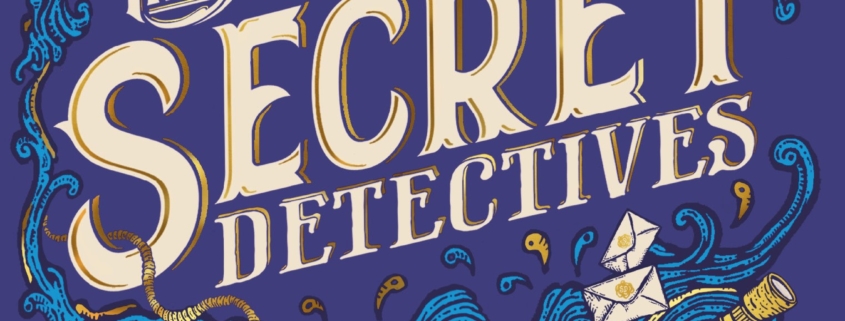The Secret Detectives by Ella Risbridger
Ella Risbridger has written a post for the FCBG all about writing The Secret Detectives and fanfiction of The Secret Garden. The Secret Detectives is published by Nosy Crow and available now!
I never thought I would write a prequel.
Even writing the word “prequel” makes me want to rush in and explain all the reasons that this isn’t really a prequel; why this doesn’t count; how my book is actually set between Chapters One and Two of someone else’s book; how I changed the names and invented a bunch of things to suit my purposes; how it’s not actually that at all. But nonetheless, here we are. I wrote what is- in effect- a prequel to a classic novel; or- and maybe this is worse, but more accurate- I wrote fanfiction.
Let’s call it what it is: my new book, The Secret Detectives, is fanfiction of Frances Hodgson Burnett’s The Secret Garden, with notes of classic golden-age murder mystery novels.
This shouldn’t have come as a surprise. I used to read a lot of fanfiction, as a teenager- Harry Potter, mostly- but the idea that books contained worlds to be played with had been with me all my life. At primary school we used to choose characters out of our favourite books- Philip Pullman’s Sally Lockhart, maybe, or just Harry Potter again- and play out scenes we invented for ourselves. In our versions different things happened, but they felt real to us. I still remember parts of Harry Potter that were never written because of how vividly we imagined them.
We played our own games, too, of course– huge, sprawling complex sagas that went on for months– but there was something comforting about playing in someone else’s universe for a little while. There was something comforting about everyone knowing the rules in advance, and even when those rules were broken, everyone understanding why, and how, and what it meant. The shape of the world had been made, but within it it was all to play for: sometimes we were characters, and sometimes we were ourselves within the world of the characters, and sometimes something in between. There was a joy in taking a universe belonging to someone else, and making it yours; and there was a sense, I suppose, of freedom in someone else having set up all the boundaries. It was restful, in a way. The infinite world of imagination was bounded, and within the limits of those parameters it made- in a paradoxical kind of way- everything possible.
Without those limits, we could spend all of playtime figuring out what to do with it. As soon as we’d settled on a game, and chosen parts, the bell would go. That never happened when we were playing Books. I see, now, that this is in some ways the same feeling as the terror of the blank page. We could do anything, be anything, but if anything, how to choose? How to choose right, and how to choose only one? There were boundaries in playing pretend with someone else’s ideas; and boundaries make people feel safe.
And yet it wasn’t just about safety: they taught us, those hard boundaries, about the limits of the authorial imagination. They taught us that authors could skimp on bits of book we wanted more of, and that we were more than capable of supplying those skimped bits for ourselves. They taught us that when we ran up against a problem- too many boys, often- we could simply change it. Ron Weasley became Rebecca. Hermione became twins.
I am saying a lot about Harry Potter here, because the Harry Potter books have become a useful shorthand. We all get the rules; we all understand the boundaries. And, too, we all understand their limitations. These last few years, there has been a lot of talk about the limitations of Harry Potter, as a book and as a concept and as a phenomenon; it seems sometimes that everyone has weighed in, from the author herself to anyone who has ever read them, and a lot of people who have never read them. I understood their limitations, or some of them, when I was eight. We all did, on the playground. It didn’t matter; we could take what we wanted from it, and change it. We could make something different from it. This is why fanfiction matters: the limitations of the written word of Harry Potter pale before the imagination and creativity of the people who read them. And, perhaps, the person who wrote them. Every writer knows that what you make is never exactly like what you intended; it comes out different. Life happens to it.
This isn’t particular to Harry Potter. This is true of all books. The magic of books happens somewhere between writer and reader, somewhere between what I wrote and you read. In reading- and, perhaps, writing and rewriting and remixing and reimagining- we get to tackle the things we don’t like about the things we love.
In my case, that was the unaddressed racism of The Secret Garden; and also the way in other books that boys outnumbered girls, and that the brave girls were always the tomboys, and that children were supposed to have –if not necessarily nice thoughts– then at least simple thoughts. I read The Secret Garden, and Agatha Christie, and Dorothy Sayers, and found limitations in them; and then I wrote this to speak to those limitations. I hope, one day, someone writes to mine. Storytelling is collaborative, and the act of being told changes the story. It’s different; we make it different; we can’t help it.
The magic of stories happens in that difference: in the fanfiction, the playacting, the telling. “If you found anything in these stories that resonated with you and helped you at any time in your life,” Daniel Radcliffe wrote last year, to disappointed former JK Rowling fans “— then that is between you and the book that you read, and it is sacred.”
I write. You read. Together, somewhere between us, something sacred happens.







Leave a Reply
Want to join the discussion?Feel free to contribute!